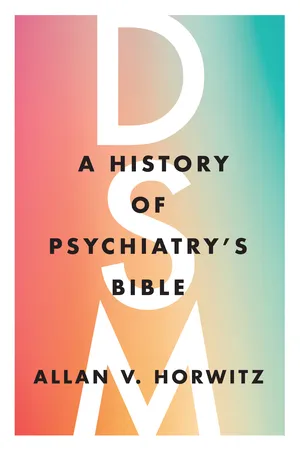
- English
- ePUB (mobile friendly)
- Available on iOS & Android
About this book
The first comprehensive history of "psychiatry's bible"—the Diagnostic and Statistical Manual of Mental Disorders.
Over the past seventy years, the Diagnostic and Statistical Manual of Mental Disorders, or DSM, has evolved from a virtually unknown and little-used pamphlet to an imposing and comprehensive compendium of mental disorder. Its nearly 300 conditions have become the touchstones for the diagnoses that patients receive, students are taught, researchers study, insurers reimburse, and drug companies promote. Although the manual is portrayed as an authoritative corpus of psychiatric knowledge, it is a product of intense political conflicts, dissension, and factionalism. The manual results from struggles among psychiatric researchers and clinicians, different mental health professions, and a variety of patient, familial, feminist, gay, and veterans' interest groups. The DSM is fundamentally a social document that both reflects and shapes the professional, economic, and cultural forces associated with its use.
In DSM, Allan V. Horwitz examines how the manual, known colloquially as "psychiatry's bible, " has been at the center of thinking about mental health in the United States since its original publication in 1952. The first book to examine its entire history, this volume draws on both archival sources and the literature on modern psychiatry to show how the history of the DSM is more a story of the growing social importance of psychiatric diagnoses than of increasing knowledge about the nature of mental disorder. Despite attempts to replace it, Horwitz argues that the DSM persists because its diagnostic entities are closely intertwined with too many interests that benefit from them.
This comprehensive treatment should appeal to not only specialists but also anyone who is interested in how diagnoses of mental illness have evolved over the past seven decades—from unwanted and often imposed labels to resources that lead to valued mental health treatments and social services.
Frequently asked questions
- Essential is ideal for learners and professionals who enjoy exploring a wide range of subjects. Access the Essential Library with 800,000+ trusted titles and best-sellers across business, personal growth, and the humanities. Includes unlimited reading time and Standard Read Aloud voice.
- Complete: Perfect for advanced learners and researchers needing full, unrestricted access. Unlock 1.4M+ books across hundreds of subjects, including academic and specialized titles. The Complete Plan also includes advanced features like Premium Read Aloud and Research Assistant.
Please note we cannot support devices running on iOS 13 and Android 7 or earlier. Learn more about using the app.
Information
Table of contents
- Cover
- Title Page
- Copyright Page
- Dedication
- Contents
- Preface
- 1 Diagnosing Mental Illness
- 2 The DSM-I and DSM-II
- 3 The Path to a Diagnostic Revolution
- 4 The DSM-III
- 5 The DSM-III-R and DSM-IV
- 6 The DSM-5’s Failed Revolution
- 7 The DSM as a Social Creation
- Notes
- References
- Index